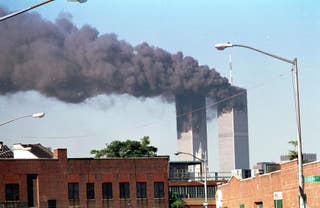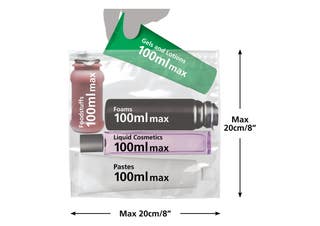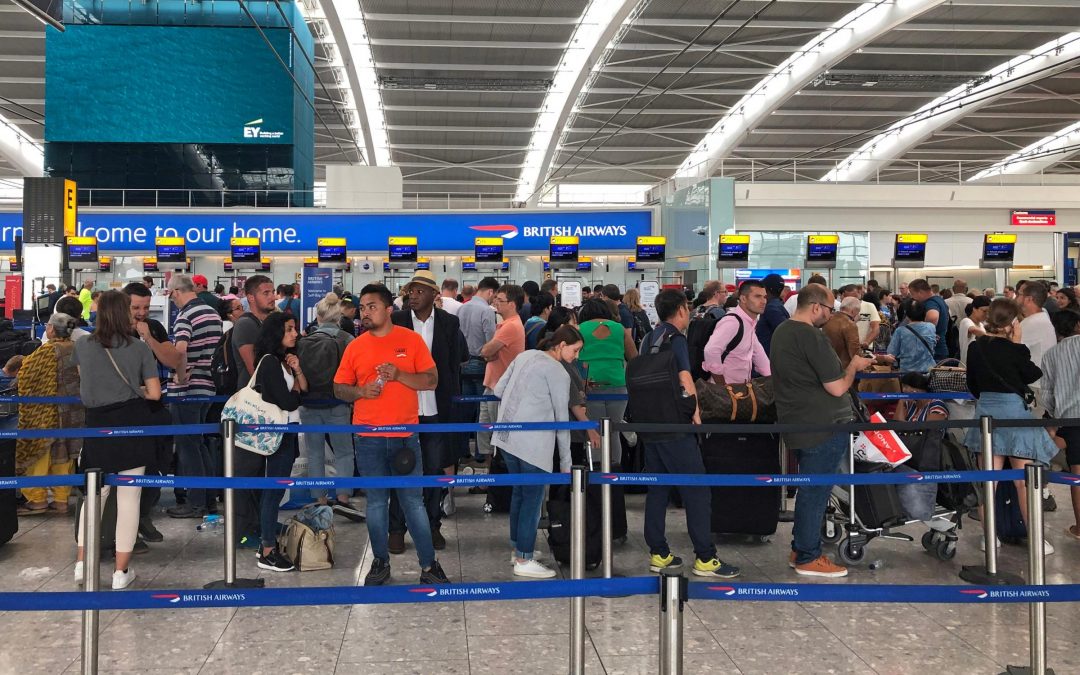[ad_1]
Ask anybody sufficiently old to recollect journey earlier than September 11 2001 and you might be more likely to get a hazy recollection of what flying was like.
There was safety screening, nevertheless it nowhere close to as intrusive. There have been no lengthy check-in queues. Passengers and their households may stroll proper to the gate collectively.
General, an airport expertise meant far much less stress.
That every one ended when 4 hijacked planes crashed into the World Commerce Centre towers, the Pentagon and a subject in Pennsylvania.

The worst terror assault on American soil led to elevated and generally tension-filled safety measures in airports the world over. It additionally contributed to different adjustments giant and small which have reshaped the airline trade — and made air journey extra disturbing than ever.
Two months after the assaults, President George W Bush signed laws creating the Transportation Safety Administration (TSA), which required that every one checked luggage be screened, cockpit doorways be bolstered, and extra federal air marshals be placed on flights.
There has not been one other 9/11 – nothing even shut – however after that day, flying modified perpetually.
Safety measures developed with new threats, so travellers have been requested to take off belts and take away some objects from luggage for scanning. Issues that clearly could possibly be wielded as weapons, just like the box-cutters utilized by the 9/11 hijackers, have been banned.
After “shoe bomber” Richard Reid’s try and take down a flight from Paris to Miami in late 2001, footwear began coming off at safety checkpoints.
Every new requirement appeared to make checkpoint queues longer. To many travellers, different guidelines have been extra mystifying, comparable to limits on liquids as a result of the mistaken ones may presumably be used to concoct a bomb.

The lengthy queues gave rise to “trusted traveller programmes” wherein folks pay a price and supply sure data to move via checks with out eradicating footwear and jackets or taking laptops out of their bag.
However that comfort has come at a value: privateness.
On its utility and briefly interviews, folks might be requested about fundamental data like work historical past and the place they’ve lived, they usually give a fingerprint and comply with a legal document examine.
Privateness advocates are notably involved about concepts that the TSA has floated to additionally study social media postings (the company’s prime official says that has been dropped), press experiences about folks, location knowledge and knowledge from knowledge brokers together with how candidates spend their cash.
Greater than 10 million folks have enrolled within the US PreCheck scheme. The TSA desires to boost that to 25 million, with the objective of permitting officers to spend extra time on passengers thought-about a much bigger threat.
On the path of Congress, the TSA will broaden using non-public distributors to collect data from PreCheck candidates. It at present makes use of an organization referred to as Idemia, and goals so as to add two extra — Telos Identification Administration Options and Clear Safe.
Clear plans to make use of PreCheck enrolment to spice up membership in its personal identity-verification product by bundling the 2 choices. That can make Clear’s personal product extra worthwhile to its prospects, which embrace sports activities stadiums and live performance promoters.
“They’re actually attempting to extend their market share by amassing various very delicate knowledge on as many individuals as they’ll get their fingers on,” says India McKinney, director of federal affairs for the Digital Frontier Basis, an advocacy group for digital rights.
TSA administrator David Pekoske stated: “We’ve got allowed the distributors to bundle their choices along with the concept could be an incentive for folks to enroll in the trusted traveller programmes.”
The TSA is testing kiosks outfitted with facial recognition know-how to examine picture IDs and boarding passes. The kiosks may even pull photographs taken when the traveller utilized for PreCheck, Ms McKinney says. That issues her as a result of it might imply connecting the kiosks to the web and probably exposing the data to hackers.
Regardless of the trauma that led to its creation, and the extreme want to keep away from one other 9/11, the TSA has often been the topic of questions on its strategies, concepts and effectiveness.
Critics, together with former TSA officers, have derided the company as “safety theatre” that offers a misunderstanding of safeguarding the travelling public. Mr Pekoske dismisses that by pointing to the large variety of weapons seized at airport checkpoints — greater than 3,200 final 12 months, 83% of them loaded.
VIDEO: Our officers proceed to find a excessive variety of firearms in carry-on luggage. You will need to at all times pack your weapons and ammunition in a checked bag. Watch the video for correct packaging steering. When you’ve got additional questions attain out to @AskTSA proper right here on Twitter. pic.twitter.com/gSZoi9NRks
— TSA (@TSA) August 31, 2021
He additionally listed different TSA duties, together with vetting passengers, screening checked luggage with 3D know-how, inspecting cargo and placing federal air marshals on flights.
“Relaxation assured: This isn’t safety theatre,” he says. “It’s actual safety.”
A number of incidents spotlight a menace the TSA wants to fret about — individuals who work for airways or airports and have safety clearance that lets them keep away from common screening.
— In 2016, a bomb ripped a gap in a Daallo Airways aircraft, killing the bomber, however 80 different passengers and crew survived. Somali authorities launched video they stated confirmed the person being handed a laptop computer containing the bomb.
— In 2018, a Delta Air Strains baggage handler in Atlanta was convicted of utilizing his safety move to smuggle greater than 100 weapons on flights.
— The next 12 months, an American Airways mechanic with so-called Islamic State movies on his telephone pleaded responsible to sabotaging a aircraft filled with passengers. Pilots aborted the flight throughout take-off.
[ad_2]
Source link


Neue Kommentare